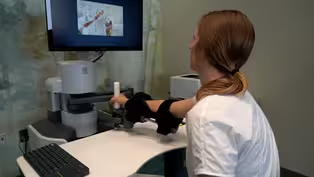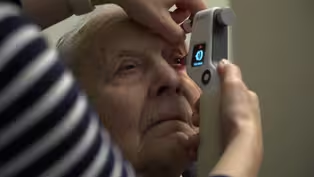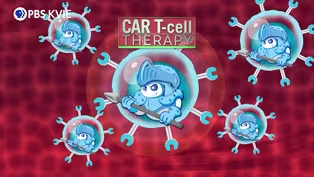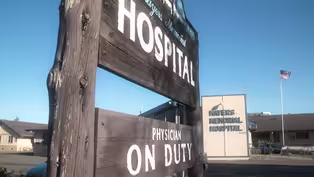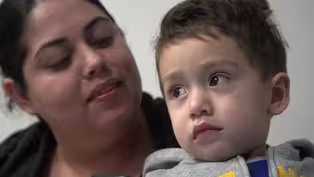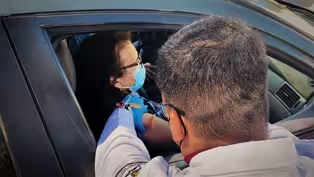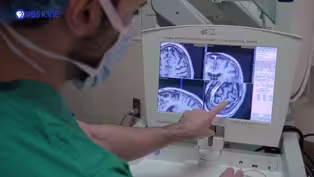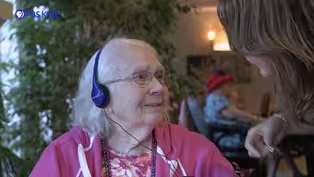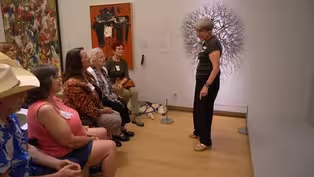KVIE Digital Studios
Pancreatic Cancer Treatment | Focus on Health
6/30/2021 | 4m 24sVideo has Closed Captions
Researchers are using new leading-edge biomedical engineering to treat pancreatic cancer.
Often called a “silent killer” with no true early warning signs, pancreatic cancer is a diagnosis specialists hate to make and share with their patients. Discover how researchers at UC Davis Health are using new leading-edge biomedical engineering to treat pancreatic cancer and provide new hope for patients.
Problems playing video? | Closed Captioning Feedback
Problems playing video? | Closed Captioning Feedback
KVIE Digital Studios is a local public television program presented by KVIE
Focus on Health is sponsored by UC Davis Health.
KVIE Digital Studios
Pancreatic Cancer Treatment | Focus on Health
6/30/2021 | 4m 24sVideo has Closed Captions
Often called a “silent killer” with no true early warning signs, pancreatic cancer is a diagnosis specialists hate to make and share with their patients. Discover how researchers at UC Davis Health are using new leading-edge biomedical engineering to treat pancreatic cancer and provide new hope for patients.
Problems playing video? | Closed Captioning Feedback
How to Watch KVIE Digital Studios
KVIE Digital Studios is available to stream on pbs.org and the free PBS App, available on iPhone, Apple TV, Android TV, Android smartphones, Amazon Fire TV, Amazon Fire Tablet, Roku, Samsung Smart TV, and Vizio.
Providing Support for PBS.org
Learn Moreabout PBS online sponsorshipMore from This Collection
Explore health topics in the Sacramento region, from robotically assisted surgery to baby massages. Videos sponsored by UC Davis Health.
UC Davis Rehabilitation Hospital | Focus on Health
Video has Closed Captions
The new UC Davis Rehabilitation Hospital maximizes the quality of patient care. (4m 15s)
UC Davis Eye Institute | Focus on Health
Video has Closed Captions
Explore the UC Davis Health Eye Institute, dedicated to advancing world-class eye care. (6m 23s)
CAR T-cell Therapy | Focus on Health
Video has Closed Captions
Explore UC Davis Health's Good Manufacturing Practice Facility. (6m 26s)
World’s Smallest Pacemaker | Focus on Health
Video has Closed Captions
UC Davis Health uses the world’s smallest pacemaker to help keep kids’ hearts healthy. (6m 7s)
Rural Doctors & Nurses Program | Focus on Health
Video has Closed Captions
Discover why rural parts of Northern California are facing a shortage of doctors & nurses. (5m 59s)
Spina Bifida | Focus on Health
Video has Closed Captions
Investigate this ground-breaking medical treatment developed by UC Davis Health. (5m 12s)
COVID Vaccine Outreach | Focus on Health
Video has Closed Captions
Aiming to bridge the gap to vaccine access in underserved communities. (4m 32s)
Deep Brain Stimulation | Focus on Health
Video has Closed Captions
Deep Brain Stimulation may help patients with movement disorders. (4m 50s)
Caregiver Simulator | Focus on Health
Video has Closed Captions
In-home caregivers are being better prepared by training in a home-like environment. (3m 44s)
Art and Wellness | Focus on Health
Video has Closed Captions
Can specialized experiences with art reduce the burden of chronic pain? (3m 33s)
Being There ... When You Can't | Focus on Health
Video has Closed Captions
UC Davis Children's Hospital's webcam program allows parents to see their babies in care. (2m 46s)
Donate Life Visual Arts Contest | Focus on Health
Video has Closed Captions
High schoolers educate their peers about organ donation through art. (4m 35s)
Providing Support for PBS.org
Learn Moreabout PBS online sponsorshipNarrator: For cancer specialists, it'’s the diagnosis they most hate to make... and to share with their patients.
Dr. Richard Bold: It is extremely unfortunate that there really are no true early warning signs for pancreatic cancer.
It's often been called the "Silent Killer".
Narrator: Pancreatic Cancer presents modest risk variations based on gender and ethnicity, but when it comes to age, persons in their late sixties and early seventies are often at a higher risk.
Dr. Richard Bold: We're approaching each of the three main barriers of pancreatic cancer which is the cause, the diagnosis, and a treatment with a breadth of investigators across all spectrums of UC Davis.
Narrator: Julie Sutcliffe, a Professor of Biomedical Engineering and Internal Medicine at UC Davis, is one of those investigators.
Professor Julie Sutcliffe: We have a very interdisciplinary team working on this project.
So, my group spent probably about 15 years developing the peptide, optimizing the peptide, doing a lot of preclinical research.
Narrator: Professor Sutcliffe and her team specialize in the development of targeted molecular imaging agents for preclinical and clinical applications in cancer.
Their work has resulted in a first-in-human trial of a PET imaging probe that only targets cancer-related receptors.
Professor Julie Sutcliffe: I'm happy to say that we opened a phase one trial with this imaging agent in 2016 looking at patients with not just pancreatic cancer, but also breast cancer, colon cancer and lung cancer.
The compound we've been working on is a peptide that has a radioactive atom on it for imaging.
We switch that radioactive atom to a different type of radioactivity.
And we can use it as a therapeutic.
So, you'll probably start to hear this term Theranostics.
Narrator: Theranostics is a combination of therapeutics and diagnostics - using one radioactive drug to diagnose and a second radioactive drug to deliver therapy to target the tumors and metastatic disease.
The UC Davis Health cancer research team received $5 million in funding from Stand Up to Cancer and the Lustgarten Foundation for Pancreatic Cancer Research to further develop the therapeutic.
Professor Julie Sutcliffe: So, we image the patients with our diagnostic and when the tumors, the tumor cells light up, we they're then eligible for treatment, and we just replace our diagnostic radioisotope with a therapeutic radioisotope for the treatment.
We are really excited to say we've actually formed the trial and recruited our first patient and actually have treated our first patient early this year.
Narrator: UC Davis Health is also fighting the battle against Pancreatic Cancer on other fronts.
Dr. Richard Bold: Five NCI Comprehensive Cancer centers have banded together to create a new platform or consortium to really do better across all malignancies, all cancers, and pancreatic cancer was one of the first.
Narrator: The UC Pancreatic Cancer Consortium is comprised of five comprehensive cancer centers at UC Davis, UC San Francisco, UC Los Angeles, UC Irvine, and UC San Diego.
Dr. Richard Bold: Just these five centers treat more than 15% of the entire state's population who are diagnosed with pancreatic cancer.
So, we're already a significant resource for the treatment.
And then layered throughout that is all of the research into the biology of the disease, the best practices for operational care, those are things that are going to come out as well.
So, we're going to have a broader impact across the country on patients with pancreatic cancer at all of the levels.
Annc: This Digital Short is supported by UC Davis Health home to the number one ranked medical center in Sacramento by US News & World Report.
Learn more about their doctors and their passion for advancing health at health.ucdavis.edu.
Support for PBS provided by:
KVIE Digital Studios is a local public television program presented by KVIE
Focus on Health is sponsored by UC Davis Health.
